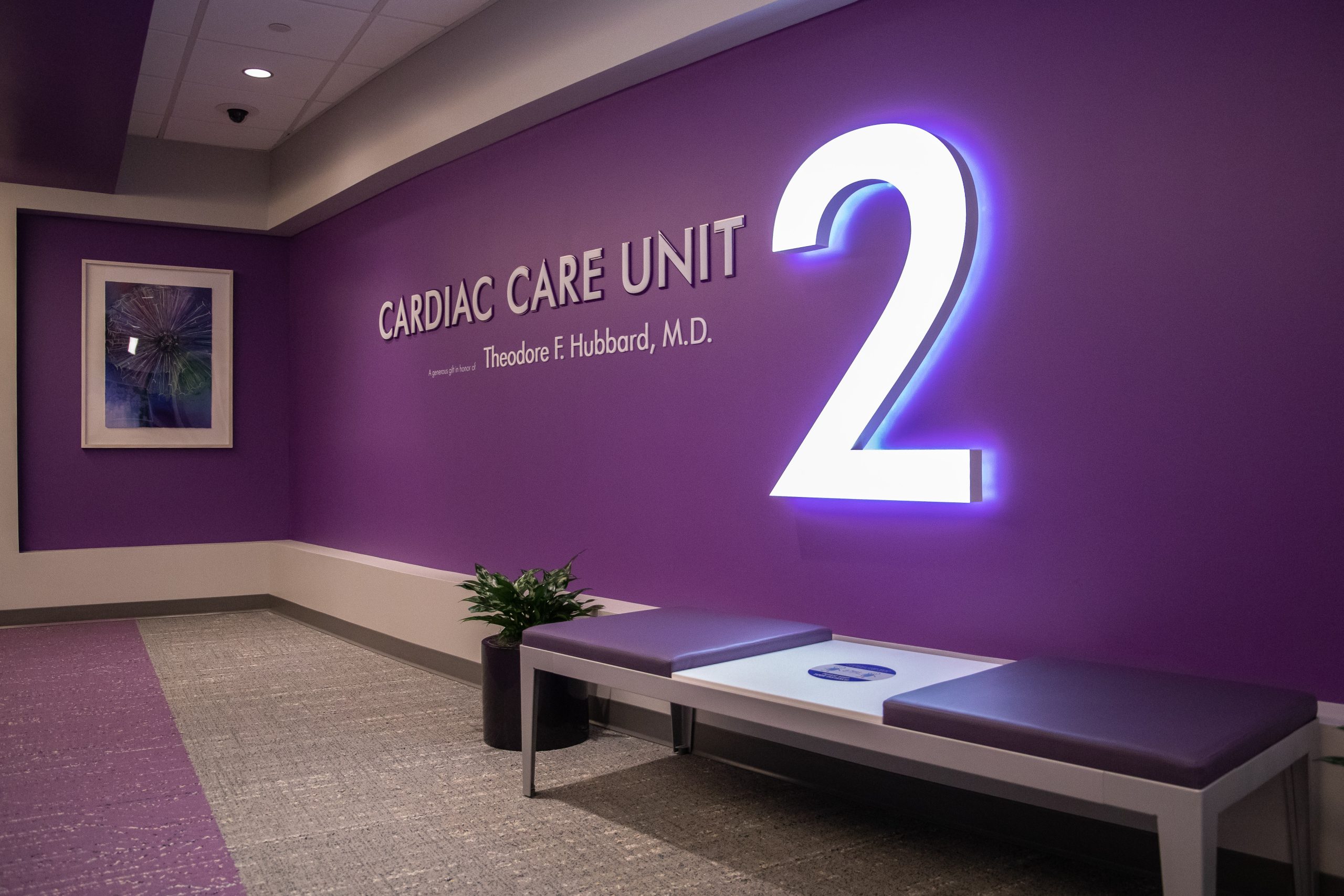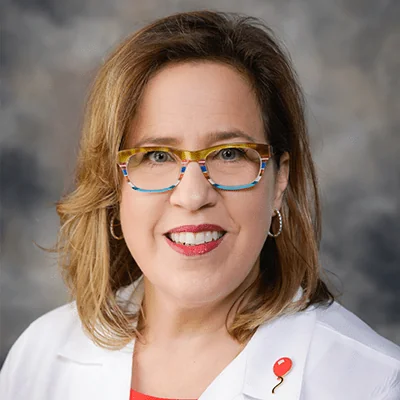Children’s Nebraska’s Advanced Pediatric Heart Failure and Transplant program cares for children in all stages of heart failure, from diagnostic evaluation to heart transplantation. Our team includes providers across specialties who create personalized care plans that address all your child’s needs. We’ll guide your family at every step, offering support before, during and long after a lifesaving pediatric heart transplant.
Our team will continue to follow your child until they are eligible to be transitioned to an adult cardiologist. When a patient turns 18, we work closely with our partners at the University of Nebraska Medical Center (UNMC) to safely transition them to adult care.
Get in Contact
A referral is required to make an appointment. After a referral has been received, we will reach out to you to schedule an appointment.
Phone 402-955-4350 | Fax 402-955-4356
Our Specialists
Our cardiac care team offers the expert, lifesaving care your child needs when faced with heart failure. Working collaboratively across specialties, we ensure your child receives the best possible care. Our dedicated providers and nurse coordinators support you every step of the way, keeping you informed throughout your child’s journey.
Conditions We Treat
The most common cause of heart failure is a heart defect that is present at birth, also known as congenital heart disease. Other causes include:
-
Heart Muscle Disease
Heart muscle disease (cardiomyopathy) is a condition that makes it harder for the heart to pump blood to the body. -
Cardiomegaly
Cardiomegaly refers to an enlarged heart muscle. This is a sign of heart weakness or damage. -
Ischemia
Ischemia happens when an organ, like the heart, doesn’t get the blood flow and oxygen it needs to work properly. -
Heart Valve Disease
Heart valve disease occurs when one or more valves don’t work properly. They may have trouble opening or closing, which changes how blood flows through the heart and body. -
Irregular Heartbeats
Irregular heartbeats (cardiac arrhythmias) happen when the heart beats too fast or too slow. Sometimes, the heartbeat pattern is inconsistent. -
Infections
Infections in the heart can be from a variety of causes, including bacteria, viruses or a fungus. -
Medicine Side Effects
Sometimes, drugs (especially those used to treat cancer) can damage the heart and make it harder to pump blood throughout the body.
Treatment Options
Our cardiac experts will complete a thorough evaluation to get to know your child and understand their condition. From there, we’ll discuss a personalized treatment plan and determine if your child is a good candidate for a heart transplant.
Our team will remain by your side to keep you informed about your child’s health. We’ll help you fully understand the treatment process so you can make the best decisions for your child. Their care plan may include:
-
Advanced Heart Failure Medical Management
Depending on the cause and symptoms, your child’s cardiologist may use a combination of medicines to treat heart failure. -
Ventricular Assist Devices (VAD) And Other Mechanical Support
Your child’s treatment may include a ventricular assist device (VAD). A VAD is an implantable device that helps the heart work while waiting for a transplant. Sometimes, our providers recommend using a VAD for rehab before receiving a transplant. Depending on your child’s condition, they may go home or stay in the hospital to recover from VAD implantation. -
Heart Transplantation
If a heart transplant is the best treatment option and your child is a good candidate, we will list them with the United Network for Organ Sharing (UNOS) to find a compatible donor. We understand that this time is difficult for families, and our team will provide ongoing care and support throughout the process. -
Surgical Or Catheterization-Based Interventions
We offer the latest surgeries and techniques to give your child the best outcome possible. Their treatment plan may include cardiac catheterization, where interventional cardiologists or cardiothoracic surgeons insert a small, thin tube to evaluate the heart’s function or repair a defect. Sometimes, our cardiologists may recommend cardiothoracic surgery to repair or replace parts of the heart.
What Sets Children’s Apart?
Multidisciplinary Care
Children’s Advanced Pediatric Heart Failure and Transplant team is comprehensive, comprising pediatric cardiologists, congenital heart surgeons, cardiac anesthesiologists, cardiac intensivists, nurse practitioners, dietitians, child life specialists, specially trained nurses, social workers and more to provide the best care possible to patients and their families.
Leading-Edge Treatments
We’re at the forefront of the latest technologies and treatment techniques to offer leading-edge care to your child. All heart transplant patients are cared for in our acuity-adaptable Cardiac Care Unit (CCU) by providers specially trained in intensive cardiac care.
Lifetime Support
When your child turns 18, we’ll safely transition them to an adult cardiologist through our partnership with the University of Nebraska Medical Center.
Next steps
You can schedule an appointment if you’d like to talk with one of our heart experts.
Step 1: Contact us by Phone
Call 402.955.4350 — it’s the best way to reach us and schedule an appointment.
Step 2: Confirm Appointment Details
Before your appointment, confirm the date, time and any resources you need to bring.
Step 3: Prepare for Your Appointment
Gather relevant medical records, test results and any other information needed.
Preparing for your appointment
When you’re worried about the health of your child, you have a lot on your plate. We’ve compiled a list of steps to ease the process and make your appointment less stressful:
Complete New Patient Paperwork
Please complete new patient paperwork and bring the forms to your appointment. If you haven’t completed the forms before you arrive, we ask that you arrive 30 minutes before your appointment. This allows time for you to complete the forms in our office.
Prepare Your Questions
Gather your list of questions or concerns you would like to discuss with the provider.
Gather Necessary Documents
Please bring the following items and any other requested information to your appointment:
- Photo ID
- A copy of your insurance card
- Any relevant medical or prior treatment records or test results
Bring Support
Your child may want to bring a small comfort item to help them feel better at their appointment. Loved ones may stay in our waiting room for added support while you and your child meet with the provider.

Cardiac Care Unit (CCU)
Children’s houses a first-in-the-region CCU, a floor exclusively dedicated to caring for the full spectrum of pediatric heart patients, meaning a child will remain on one floor for their entire hospital stay. Working alongside Children’s physicians and specialists, the CCU team includes highly skilled nurses and advanced practice providers specially trained in providing exceptional care to pediatric patients with cardiovascular conditions.
Patient Spotlight

Victoria’s Story: Heart Transplant Gives Family Fresh Hope
 Born premature at 30 weeks, Victoria was born with a heart condition known as cardiomyopathy. This means her heart was bigger than normal, making it difficult for her heart to pump blood to the rest of her little body. Read More
Born premature at 30 weeks, Victoria was born with a heart condition known as cardiomyopathy. This means her heart was bigger than normal, making it difficult for her heart to pump blood to the rest of her little body. Read More
Angelina

Angelina experienced ventricular fibrillation (VF), a life-threatening arrhythmia that’s considered the most serious abnormal heart rhythm. Read More
What To Do Next
For Referring Providers
Early referrals are key to ensuring the best possible outcomes for patients and families. We will keep you updated throughout the entire care and transplant process. Referrals can be made by calling 402.955.4350
The Physicians’ Priority Line is your 24-hour link to pediatric specialists at Children’s for emergency and urgent consults, physician-to-physician consults, admissions, and transport services. Call 855.850.KIDS (5437).
Learn more about referring patients.







